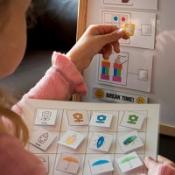 With the magnitude of demands placed on special needs families, siblings of special needs children can often feel overlooked and in need of emotional support. A “special needs child” is defined as having a medical, developmental, or neurological challenges, or another type of disability which impacts the entire family system, thereby requiring special supports (i.e. medical, educational, etc.). In many families where such challenges are present, it’s inevitable that the added stress impacts not only parents and the child in question, but also typically developing siblings. In fact, rates of depression, anxiety, and chronic stress are higher for the special needs family. But with adequate supports, such impediments can be reduced. Special needs disabilities can run the gamut from severely disabling conditions, such as cerebral palsy, in which a child is wheelchair bound and cannot speak, to a high-functioning child with an “invisible” disability, such as attention deficit (ADHD) or dyslexia.
With the magnitude of demands placed on special needs families, siblings of special needs children can often feel overlooked and in need of emotional support. A “special needs child” is defined as having a medical, developmental, or neurological challenges, or another type of disability which impacts the entire family system, thereby requiring special supports (i.e. medical, educational, etc.). In many families where such challenges are present, it’s inevitable that the added stress impacts not only parents and the child in question, but also typically developing siblings. In fact, rates of depression, anxiety, and chronic stress are higher for the special needs family. But with adequate supports, such impediments can be reduced. Special needs disabilities can run the gamut from severely disabling conditions, such as cerebral palsy, in which a child is wheelchair bound and cannot speak, to a high-functioning child with an “invisible” disability, such as attention deficit (ADHD) or dyslexia.
Special needs siblings may feel the following:
- guilt about being a “typically” developing youngster;
- embarrassment about a sibling’s behavior in front of friends;
- frustration that the sibling may not be able to relate or play at the same level;
- worries about the health and survival of the sibling, and the impact of responsibility placed upon the sibling once parents become elderly;
- resentment that attention/services are diverted to the special needs sibling;
- loneliness, or a feeling that peers may not understand what they are going through;
- parentification in caretaking role of sibling, should parents not have adequate support/resources or emotional attunement to the sibling. It would make sense that special needs siblings might be at higher risk for depression and anxiety if they do not have support and resources available.
Your child may benefit from a referral to a competent and compassionate psychotherapist who specializes in special needs family therapy. It is of vital importance to special needs parents is to look for the following symptoms in siblings of special needs children:
- feelings of hopelessness, marked depressed or anxious mood for more days than not, isolation and withdrawal from peers, or a drop in grades or absence from school;
- marked increase in irritability;
- insomnia, appetite changes, panic attacks, and any clear behavioral/mood change that is in sharp contrast to the child’s typical baseline mood/behavior.
Likewise, if any parent/caregiver exhibits the above symptoms, I recommend seeing a family psychotherapist as soon as possible.
There are also many benefits and unique experiences for siblings of special needs children, however. They have the opportunity to learn caregiving and sensitivity that many of their peers may not experience.
Special needs siblings may also feel the following:
- higher level of maturity than peers, given the opportunities to practice empathy and patience with the special needs sibling;
- ability to embrace cultural diversity as relates to special needs and families that are not “typical”;
- protectiveness of the sibling, should he or she be in a position of bullying;
- pride in milestones accomplished by the special needs sibling;
- tolerance of people’s differences;
- increased emotional intelligence and insight to the human condition;
- opportunities to be involved in a strong family unit that focuses time and attention on all family members;
- loyalty to and cohesiveness with the family unit;
- gratitude for health and vitality;
- appreciation for siblings’ gifts/strengths, in light of any challenges;
- social adeptness: the sibling often is quite gifted in reading social cues and relating to people, having had much practice “translating” the world to the special needs sibling;
- resilience: they have also had much practice in managing adversity; they are often well-prepared for the real world, having had to problem-solve and endure challenge as a young person;
- creativity and resourcefulness: Siblings often must creatively problem solve strategies to help special needs families work around the special needs child (i.e. researching wheelchair friendly restaurants, creating a music CD for a blind sibling, etc.)
- mindfulness, focus, and gratitude: many siblings have found a peaceful emotional state as they accept the challenges and advantages that accompany a special needs family.
It is true that there are an equal or greater number of positives and opportunities for the special needs sibling, when given the appropriate support and resources. Several websites and references are listed at the end of this article to support the special needs sibling in acquiring appropriate support to thrive and embrace being a special needs family member. The following objectives are also of great importance for special needs parents, in an effort to ameliorate the stress involved with being a member of a special needs family:
- Provide ample one-on-one attention to all children in the family, not just the special needs child.
- Maintain high standards and expectations for all children, and, as much as possible, an expectation for all children in the household to abide by the same rules, consequences, and privileges.
- Be able to describe the special needs child’s disability to your “typical” child in a developmentally sensitive manner. Allow your child to ask questions about medical/educational/etc. interventions, course of treatment, what to expect long-term, etc. Be aware that preschool-age and younger may have a difficult time understanding and may need play/art therapy with a trained professional to assist in understanding the disability and answering any questions the child has. Older children (school-age) may wonder if the disability is contagious, and may need reassurance that they can’t “catch” the disability. Teens may need help with their mixed feelings of loyalty and embarrassment, as peer relationships become increasingly more important. Children of all ages may wrestle with guilt that they do not struggle with the same challenge as their siblings, and may even feel a pressure to achieve greater accomplishments to compensate for any “deficits” in their sibling.
- Reassure your typically developing child that his/her sibling is receiving the services he/she needs to develop optimally, that it is not their fault that their sibling has a disability, and that it is paramount to be a unique individual with her/his own unique dreams and gifts. Take the pressure off siblings and practice stress management activities like deep breathing, journaling, family discussions, and family fun.
- Family fun is really important. Find ways the entire family can bond together and laugh, whether you do something like swimming, hiking, singing, Pictionary, or whatever common-ground activity brings smiles, laughter, and family unity.
- Connect your typically developing child with a support group for special needs siblings to reduce isolation, increase validation, and reduce stress (see #5 in Resources, below).
- Acknowledge any concerns siblings may feel or demonstrate in behavior, and do not hesitate to enroll your child/family in a supportive psychotherapy program for the entire family.
- Model self-care as a parent; get your own psychotherapy, self-care regimen, and support, engage in stress-reduction activities, and include your family or designate a quiet time where everyone practices meditation, deep breathing, yoga, listening to music, etc.
- Allow typically developing siblings to have their own activities, which are specific to their talents and interests. Help them to flourish by attending sporting events, cheering them on, and encouraging friends and family to do the same. Honor each family member with rewards for unique gifts and talents (winning a spelling bee, scoring a goal in soccer, etc.). Pay attention to each family member and celebrate everyone’s successes and triumphs.
Most importantly, keep communication open with regular family meetings to problem solve about communication issues, chores, etc. Then take the opportunity to play a family game, laugh, dance, sing, and bond. As parents, keep a positive spin on being a special needs family; your situation does not have to be one of drudgery.
On the contrary, with the right resources and supports in place, life can be deeply meaningful, full of purpose, and imbued with unconditional love. Gifts and talents not detected before are discovered and embraced. Life can actually be beautiful. It is up to the parent to set the tone, to take the “emotional read” on the family, and link the family up with resources and supports, which make a world of difference in supporting the emotional health of the special needs family.
Resources for special needs siblings:
- Siblingsupport.org: for a listing of support groups for special needs siblings and how to get a group up and running in your community
- Thearc.org: sibling support network
- med.umich.edu/yourchild/topics/specneed.htm: University of Michigan link for special needs families
- friendshipcircle.org/blog/2013/04/25/the-importance-of-parental-support-and-guidance-for-special-needs-siblings/: Article with resources for sibling support The Friendship Circle website
- nytimes.com/2001/03/06/health/06SIBL.html: Article from New York Times (2001) in support of special needs siblings
- Meyer, Donald and Vadasy, Patricia. (2008). Sibshops: Workshops for Siblings of Children with Special Needs (Revised Edition), Brookes Publishing Co.
- Meyer Donald. (1997). Views from Our Shoes: Growing Up with a Brother or Sister with Special Needs, Woodbine House.
- Meyer, Donald. (2005). The Sibling Slam Book: What it’s Really Like to have a Brother or Sister with Special Needs, Woodbine House.
- Bleach, Fiona. (2002). Everybody is Different: A Book for Young People Who Have Brothers or Sisters with Autism
- Gordon, Michael. (1992). My Brother is a World-Class Pain: A Sibling’s Guide to ADHD-Hyperactivity
- Stuve-Bodeen, Stephanie and Devito, Pam. (1998). We’ll Paint the Octopus Red
- Choldenko, Gennifer. (2004). Al Capone Does My Shirts
- The Sibling Information Network Newsletter: for quarterly support for special needs families

The preceding article was solely written by the author named above. Any views and opinions expressed are not necessarily shared by GoodTherapy.org. Questions or concerns about the preceding article can be directed to the author or posted as a comment below.

 Travel Tips for the Special Needs Family
Travel Tips for the Special Needs Family Transitions: Three Tips to Make Them Easier for Children with Autism
Transitions: Three Tips to Make Them Easier for Children with Autism Raising a Child with Special Needs: What About Your Needs?
Raising a Child with Special Needs: What About Your Needs?

